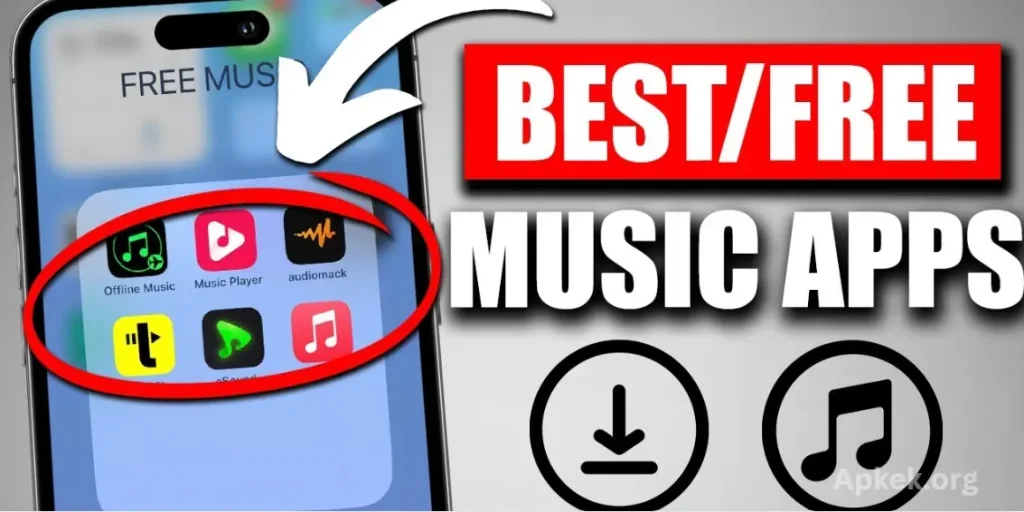Music is often described as the universal language of the soul, a powerful medium capable of soothing emotions and calming the mind. Whether we’re experiencing joy, sadness, or confusion, music has the unique ability to provide comfort and clarity. Rooted in ancient practices, particularly within Sufi traditions, music has long been regarded as a tool for spiritual peace and emotional healing.
In today’s world, music plays a pivotal role in all aspects of our lives, from providing an emotional backdrop in movies and dramas to shaping cultural identities. It has the power to evoke deep emotions, creating lasting connections between listeners and stories. With the rise of digital platforms, music is more accessible than ever, allowing people to enjoy their favorite songs at the touch of a button.
However, while services like YouTube offer a wealth of free content, many platforms require a subscription to access premium features and high-quality music. But don’t worry—there are several apps available in 2025 that allow you to stream music for free, without any hidden fees.
In this article, we will explore some of the best free music apps available in 2025, detailing their unique features and how they can enhance your music listening experience—without costing a penny. Let’s dive in!
In this article, we’ll explore the best free music apps of 2025 and the standout features of each one, so you can choose the platform that suits your music tastes and needs.
1. Spotify Free
Best For: Music discovery, playlists, and personalized recommendations
Spotify has long been a top contender in the music streaming world, and its free version remains an excellent choice for anyone who enjoys a large variety of music without the need to pay. Spotify Free allows users to access millions of tracks, playlists, and podcasts, although with some limitations such as ads and restricted skips.
Key Features:
- Vast Music Library: Access over 70 million tracks.
- Discover Weekly: Personalized playlists based on your listening habits.
- Playlist Creation: You can create, save, and share playlists.
- Cross-platform: Available on smartphones, tablets, and desktops.
Limitations:
- Ads play between tracks.
- Shuffle mode is mandatory for many playlists (no on-demand track selection).
2. YouTube Music
Best For: YouTube integration and video-based music experience
YouTube Music has gained popularity by offering a seamless experience for users who enjoy listening to music videos alongside their audio tracks. It’s particularly appealing for those who like to discover live performances, music videos, or covers of popular songs.
Key Features:
- Music Videos: Full access to official music videos and user-uploaded content.
- Music Discovery: YouTube’s powerful recommendation algorithm helps you find new artists and genres based on your listening history.
- Offline Listening: Allows offline downloads with a premium plan, but free users can still enjoy music with an internet connection.
- Integration with YouTube: You can easily switch between audio and video formats.
Limitations:
- Frequent ads interrupt playback.
- Limited background listening unless you pay for YouTube Premium.
May you also like it:
Jazz Package Codes 2025: Complete Guide
Top 10 Best Useful Android Apps
Best App To Watch Live Cricket Match
Top 5 WhatsApp tracker in 2025
3. Pandora
Best For: Personalized internet radio and curated playlists
Pandora remains a favorite choice for music lovers who enjoy curated playlists based on their tastes. Pandora’s free tier offers an internet radio-like experience, where you can create personalized stations based on artists, songs, or genres.
Key Features:
- Personalized Stations: Create stations based on your favorite artists or songs, and Pandora will recommend similar tracks.
- Thumbprint Radio: A unique feature where Pandora plays songs you’ve liked across various stations.
- Easy-to-use Interface: Simple and clean layout, ideal for quick access to your favorite music.
Limitations:
- Ads interrupt playback.
- Limited skips per hour on personalized stations.
- Only available in select countries (mainly the U.S.).
4. SoundCloud
Best For: Indie music, emerging artists, and user-generated content
SoundCloud is a platform that’s particularly popular with indie musicians and emerging artists. It offers a huge variety of tracks, including both official releases and content uploaded by independent creators. If you’re looking to discover fresh music before it hits the mainstream, SoundCloud is a fantastic option.
Key Features:
- Diverse Library: Includes songs from independent artists, remixes, and even podcasts.
- Create Playlists: You can create and share custom playlists with others.
- Tracks from Emerging Artists: Discover new talent and niche genres.
- Follow Your Favorite Artists: Get updates on new releases from artists you follow.
Limitations:
- Frequent ads during playback.
- Limited offline listening features (for free users).
- Some tracks may be of lower audio quality compared to premium services.
5. Deezer Free
Best For: Music variety and podcasts
Deezer is another great music streaming service offering a free tier with access to a large catalog of songs, albums, and podcasts. While the free version comes with ads and some limitations, it’s an excellent option for those who enjoy curated playlists and podcasts along with their music.
Key Features:
- Access to 73 million tracks: Deezer boasts a wide range of songs across all genres.
- Flow: A personalized playlist feature that adapts to your listening habits and preferences.
- Podcasts & Radio: Offers an impressive range of podcasts and radio stations in addition to music.
- Cross-platform Support: Available on smartphones, tablets, and desktops.
Limitations:
- Ads interrupt playback.
- Limited skips for free users.
- No offline listening unless you upgrade to a paid plan.
6. Amazon Music Free
Best For: Amazon ecosystem users and Alexa integration
Amazon Music Free is a great option for those who are already invested in the Amazon ecosystem. While the free version doesn’t offer the full range of features found in Amazon Music Unlimited, it still provides access to a wide variety of songs and playlists, especially if you’re an Amazon Prime member.
Key Features:
- Access to Millions of Tracks: Listen to a limited but substantial catalog of songs.
- Alexa Integration: Easy voice control via Amazon Alexa for hands-free listening.
- Playlist Creation: Create and listen to personalized playlists based on your preferences.
Limitations:
- Ads between tracks.
- Limited catalog compared to Amazon Music Unlimited.
- Restricted skips and fewer features than premium users.
7. iHeartRadio
Best For: Live radio and curated stations
iHeartRadio is an excellent app for music lovers who enjoy live radio stations. It’s especially popular for listening to local radio stations, news, and talk shows. The app also provides curated playlists and podcasts for a well-rounded music and entertainment experience.
Key Features:
- Live Radio Stations: Listen to thousands of live radio stations from around the world.
- Curated Playlists: Offers playlists based on genres, moods, and activities.
- Podcasts: Access a wide range of podcasts, including exclusive shows.
- Personalized Stations: Create your own stations based on favorite artists and songs.
Limitations:
- Ads interrupt playback.
- Limited skips on personalized stations.
- Free version has fewer features than the premium tier.
Frequently Asked Questions
Are there any ads on free music apps?
Yes, most free music apps include ads as a trade-off for providing free access to their music libraries. While ads can be annoying, they help support the service and keep it free for users. If you want an ad-free experience, you’ll need to upgrade to a paid subscription.
Can I listen to music offline with free music apps?
Offline listening is typically a feature reserved for premium or paid plans. While apps like Spotify Free and Deezer Free do allow you to create playlists and save songs, you will need an internet connection to stream them. If offline listening is essential to you, consider exploring the premium versions of these apps, which allow you to download music for offline use.
Do free music apps limit the number of songs I can skip?
Yes, many free music apps limit the number of songs you can skip in a given time period. Spotify Free restricts the number of skips per hour, and Pandora limits skips on personalized radio stations. These limitations are part of the trade-off for using a free service.
Can I create custom playlists on free music apps?
Yes, most free music apps allow you to create your playlists. Spotify Free, SoundCloud, and Deezer Free are powerful in this area, letting you curate and organize your music as you like. However, with certain apps like Pandora, you can only create personalized radio stations rather than entire playlists of specific songs.
Are there any restrictions on music quality with free apps?
Yes, free music apps often limit the quality of music streams. For example, Spotify Free streams at a lower bit rate (160 kbps) compared to its premium tier (320 kbps). Similarly, Deezer Free and YouTube Music may offer lower audio quality for free users. If you prioritize high-quality audio, consider upgrading to a paid version.
Can I use free music apps on multiple devices?
Yes, most free music apps are cross-platform, allowing you to use them on smartphones, tablets, and desktops. For example, Spotify Free, Deezer Free, and YouTube Music all enable seamless switching between devices. Just log in to your account on different devices, and your playlists, preferences, and recommendations will follow you.
How does music discovery work on free apps?
Free music apps like Spotify, YouTube Music, and Pandora all offer personalized music discovery features. Spotify Free provides curated playlists such as Discover Weekly, while Pandora generates customized stations based on your listening preferences. YouTube Music leverages its algorithm to recommend new tracks and artists based on your past activity.
Do free music apps offer podcasts and other audio content?
Yes, many free music apps also feature podcasts, radio shows, and other audio content. Deezer Free and Spotify Free provide access to podcasts alongside their music libraries, while iHeartRadio is known for its vast collection of radio stations and podcasts. YouTube Music also offers podcasts and music videos, making it a great all-in-one audio platform.
Conclusion
There are numerous free music apps available, each offering its own set of features, benefits, and limitations. While premium services may provide an ad-free experience and additional features like offline listening and higher audio quality, the best free music apps still deliver a fantastic music streaming experience for no cost.
If you’re someone who enjoys music discovery and curated playlists, Spotify Free is an excellent option with its vast library and personalized recommendations. For those who prefer a seamless blend of music and video content, YouTube Music offers the unique advantage of access to official music videos alongside its audio tracks. If you’re into live radio and talk shows, iHeartRadio provides a great mix of music and podcasts. On the other hand, SoundCloud is ideal for discovering indie and emerging artists, while Pandora excels in its personalized internet radio-style experience.

